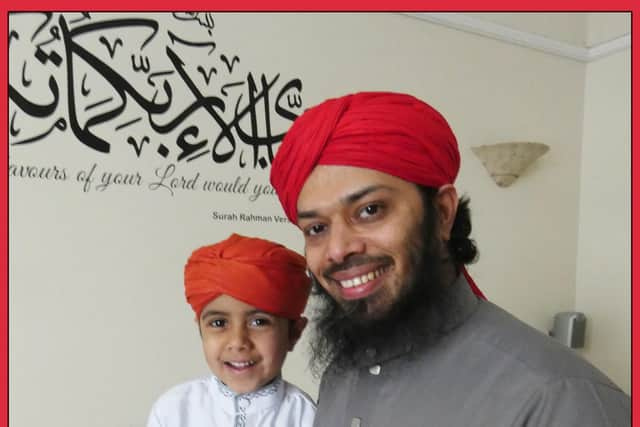Ramadhan 2023: Muslim communities in Dewsbury, Batley and Spen prepare to begin holy month of fasting
and live on Freeview channel 276
Senior religious leaders waited from Wednesday evening onwards for news as to whether the new moon had been sighted. The sighting of the new moon, or the "Ramadhan Moon", is a sign for Muslims to begin their four weeks of fasting.
Muslim families will fast from sunrise to sunset over the next four weeks during a special holy time of the year.
Advertisement
Hide AdAdvertisement
Hide AdRamadhan is a special spiritual holy month within the Islamic calendar and is one of the main five pillars of the global Abrahamic religion.


The first pillar testifies to the Muslim belief in one supreme Lord - a powerful entity also worshipped by Jews and Christians.
The second pillar is praying five times a day and the third involves giving a yearly welfare contribution to those who are poor and in need of help.
The month of fasting known as Ramadhan is the fourth pillar, while the fifth pillar is going on a "Hajj" pilgrimage to those exact holy sites in Saudi Arabia where Prophet Mohammad walked nearly 1,400 years ago.
Advertisement
Hide AdAdvertisement
Hide AdDuring the month of Ramadhan, practising Muslims across the globe, as well as those living in our region, will not be eating or drinking between the hours of early-dawn until sunset.
Early-dawn is a time when a thin strip of light appears on the horizon just before day-break, and from then onwards all Muslims fast until sunset (when the sun goes down at dusk).
The faithful will be waking up this year at around 4.30am in the morning to eat what is called a "Sehri" meal. The fasting shall then begin, after which nothing else will be eaten until 7.30pm in the evening. The fast is ended with an evening "Iftari" supper.
It is total fasting, which means going without food and water for nearly 15 hours just to please the Creator, the Lord God.
Advertisement
Hide AdAdvertisement
Hide AdBecause Islam as a religion follows the lunar calendar, the dates for Ramadhan tend to rotate forward every year by at least 10 days. This means the month of fasting starts 10 days earlier on a yearly basis. The start date for this year is Thursday, March 23.
Certain groups of people do not have to fast during the holy month of Ramadhan. These are children under the age of puberty, pregnant mothers, women going through periodical cycles, the sick, those who are mentally ill, diabetic patients who are unable to adjust their insulin injection times during the hours of fasting, and those who are likely to be travelling over a distance of 57 miles.
Locally renowned Muslim "Naath" poet, Mohammad Yasir Attari, from Albion Street in Heckmondwike, and his young son, Ahmed Raza, have, like so many others, eagerly awaited the onset of Ramadhan.
He said: "According to Islamic teachings, the Lord makes it clear there are eleven months for everyone including Muslims to eat and drink at daytime.
Advertisement
Hide AdAdvertisement
Hide Ad"However, the Creator also asks those who believe in him to fast for one month as a form of worship when there should be no eating or drinking during daylight hours."
He added: "Judeo-Christian scriptures, and the Koran, as well as Biblical history, make it clear prophets like Abraham, Jacob, Joseph, Moses, Aaron, Joshua, David, Solomon, Jonah, Elias, Daniel, Zecheriah, John The Baptist, Jesus Christ, and the final prophet Mohammad, all used to fast regularly.
"Through fasting, these prophets were making an even greater effort to bring themselves closer to the Lord.
"Fasting also used to play a role in traditional English Christian society, especially at the time of Lent. Fasting also has an important place in the Jewish calendar during Yom Kippur.
Advertisement
Hide AdAdvertisement
Hide Ad"Meanwhile Muslims wherever they are abstain four weeks in a row from food and drink by fasting in Ramadhan."
"Fasting for Muslims is all about self-control and aiming to please the Lord God. It is seen as another form of worship in the Islamic religion."
Although young Ahmed Raza will not be fasting, he will, like many children his age, enjoy the evening "Iftari" gatherings at home with his parents.
The "Iftari" supper can be a variety of spicy Indian dishes including biryani rice, samosas and kebabs, quiches and curries, topped with desserts like ice cream, fresh fruit and yogurts, as well as much more.
Advertisement
Hide AdAdvertisement
Hide AdBut the first thing eaten by everyone after the day's long fast is sweet Arabian dates.
The four weeks of fasting are expected to end by April 22, when Muslims everywhere will then celebrate the festival of Eid-Ul-Fitr.